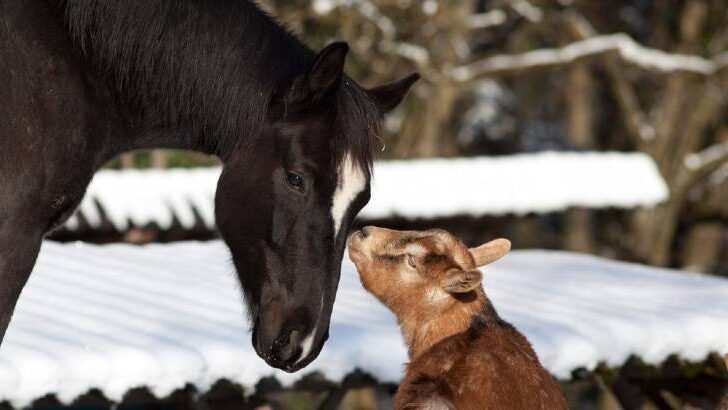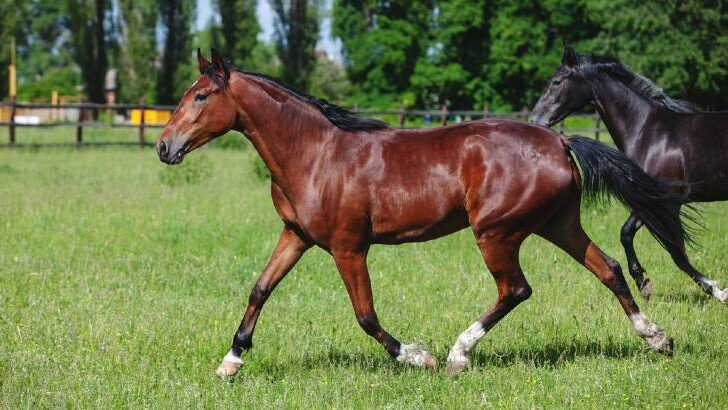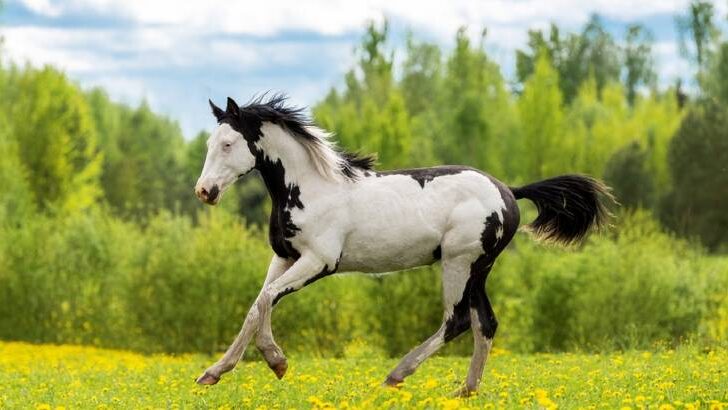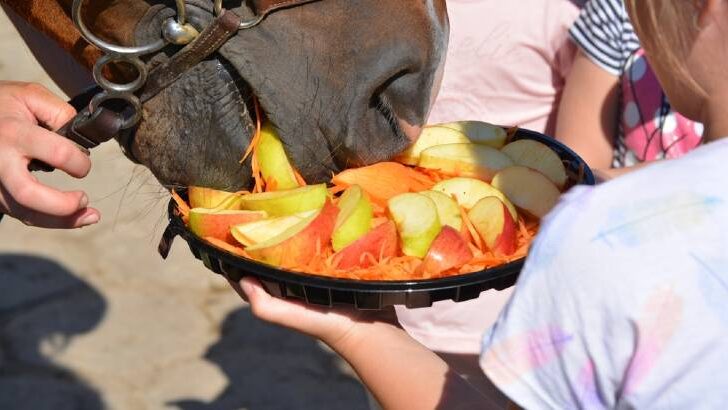Affiliate Disclaimer
As an Amazon Associate I earn from qualifying purchases. It helps me keep the website going. Thank you for your support.
Horses are prey animals, which means that they have a strong instinct to flee in the face of danger. This means that they can be jumpy and spook easily if scared. One solution is for your horse to share its day-to-day space with a goat. It’s known that goats have a calming effect on horses. But why do goats calm horses?
Goats calm horses because of their friendly and carefree demeanor. They’re also small in size and therefore not intimidating to a horse. If your horse is lonely or easily stressed, goats make great companion animals.
Let’s take a closer look at the benefits of socializing horses and goats. And consider some ways that you can make this unlikely friendship work.
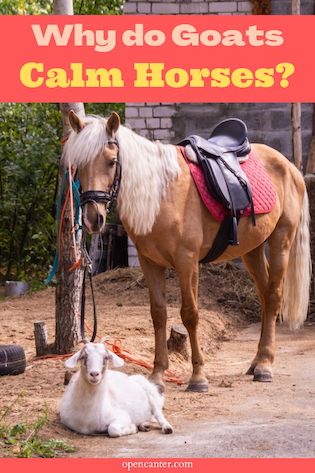
How do Goats Calm Horses?
Horses are herd animals, meaning they crave companionship and are generally much healthier when allowed to socialize. Even if your horse is stabled at night, it should spend time outside with other animals, and shouldn’t be isolated when inside either.
For some, this is difficult, especially if your farm or property is small. It may not be possible to have multiple horses, but that’s okay! The great thing about horses is that they can get along with a wide variety of other animals. Some horses have even been known to bond with dogs and cats.
The best companion for a horse, though, is another herd animal. If it can’t be another horse, things like cows, donkeys, and goats are great alternatives. While there are some considerations you must make, these types of mixed herds can work out beautifully.
In addition to providing the animals with socialization and companionship, you’ll enjoy a few other benefits:
- Mixed herds help keep the grass levels balanced as they have different preferences.
- Different animals attract/carry different parasites, which can actually help keep each other healthier.
- You can use less space by keeping them all together.
Goats and Racehorses
There are many circumstances in which you may find yourself needing a calming companion for your horse. One of the most common situations, though, is with racehorses. While some owners have an entire herd of racehorses, some people have just one! Either way, goats are often paired with racehorses.
If racing is your business, it’s in your best interest to keep your top athlete (the horse!) in tip-top shape. This goes beyond ensuring they’re exercised, trained, and well-fed. Their emotional state and mental health are just as important. Even the most physically prepared horse won’t run well if they’re lonely, depressed, angry, stressed, etc.
Historically, goats have been used to accompany horses for a few reasons:
- They can be high-energy and playful, but they don’t tend to be very aggressive. Playfulness can be especially beneficial to a young energetic horse that is easily bored.
- They are small and often won’t scare the horses.
- Their small size also means they’re cheaper to maintain in terms of space and feeding requirements.
- Goats eat the weeds that horses often leave behind.
- Goats have easy and low-maintenance diets – making them easier and cheaper to keep around than additional horses.
In fact, the well-known racing establishment Churchill Downs has a few goats at the ready on race day. Roxanne, Lily, and Trever are some of the most familiar faces. These goats are taken around the stables before races, and their happy, calm auras rub off on the horses. They’re also often taken to interact with the most nervous and flighty horses to help take their edge off.
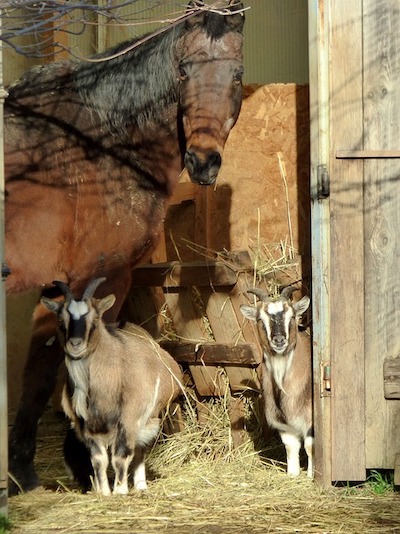
6 Tips on How to Safely Mix Horses and Goats
Horses and goats can make a wonderful and mutually beneficial pairing, but you still need to do it right. The following tips will help you prepare yourself, your property, and your animals for successful new friendships:
1) Use Appropriate Fencing
Horses are curious and powerful – they can and sometimes will try to jump out of a field if they want to. Goats are smart and small, they can and will try to weasel their way out of weak or open fencing.
This means that you must put up the right fencing to keep everyone in safely. The minimum recommended height for goats is four feet, though you’ll probably want to go at least five for horses. Make sure there aren’t any large openings or gaps, and make sure it’s nice and sturdy!
Horses are great at getting themselves caught in unlikely and dangerous situations. Barbed wire, for example, is a huge no-no for horses. You must also consider the safety of your goats with horns and ensure there’s nothing they can get caught on.
2) Feed Separately if Necessary
Horses and goats can usually enjoy the same grass, and goats don’t often even need much hay. However, most horse grains and/or supplements may be toxic to your goats. If your horses are on anything special, consider bringing them inside or somewhere isolated each day for their meals.
Similarly, if your goats do require special feeds or supplements, it’s best to keep them away from horses.
3) Introduce Them Gradually
Just like any new introduction, you should be slow and careful when bringing them together. Horses are big animals and goats are very playful. If they don’t get along with each other, this can end badly.
Always supervise the first few meetings, should you need to intervene. If you’re trying to mix multiple animals into one herd, consider introducing one at a time to make things less stressful.
If you have a barn and your animals are stabled, you can put them next to each other for a few days. This allows them to get comfortable with each other, without having any access.
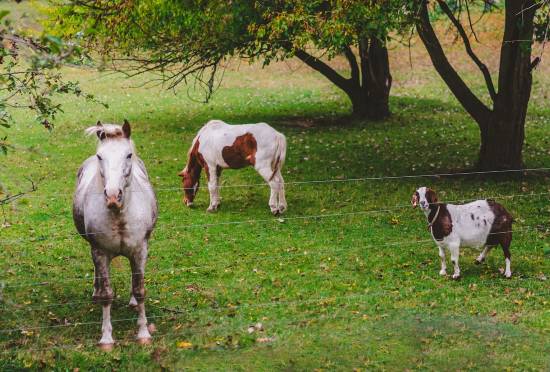
4) Avoid Certain Pairings
Just because horses and goats can get along, doesn’t mean they always will. There are certain pairings and situations that may not work as well. When deciding which animals to mix, keep these things in mind:
- Male goats tend to be more aggressive than females, so consider getting only females for your horses.
- Many female goats also don’t have horns. Horns can be potentially harmful and dangerous to your horses, should any fights occur.
- Pygmy goats may have the right temperament to bond with horses, but they’re so small. Your horse may injure or wound a pygmy goat without even meaning to, thanks to their size. If you can, consider getting more normal-sized goats for your horse.
- Stallions can be more high-strung and aggressive, and sometimes can’t even be kept with other horses. This does not apply to all stallions, but be extra careful if you’re considering a stallion and goat together.
5) Watch Out for Your Horse’s Tail
Goats are not picky eaters at all. While this is great news for your fields and weeds, it’s not so great when they decide your horse’s tail looks like a tasty snack! If you see goats chewing on your horse’s tail, nip it in the bud as soon as possible.
Not only can this make the horse’s tail look uneven and raggedy, but it can be dangerous. If the horse gets irritated enough, it may act out and kick its goat friend.
6) Learn About Goats
Lastly, it’s important to educate yourself about goats. Especially if you are getting goats specifically to accompany your horse and you have no prior experience. One of the best things you can do is consult others who have goats already. Also, consider speaking to a large animal veterinarian to learn more.
A few tips on goats to get you started:
- Even though they’re small, they still require space to run around. You should provide about a quarter of an acre per goat.
- Goats generally don’t like getting too wet, so dry and well-ventilated shelter is essential. This is contrary to horses who often enjoy standing in the rain!
- Nubian and pygmy goats are best for beginners, but take some time to learn about the different types.
- Goats also require socialization and companionship to thrive. So, if they don’t end up getting along with your horse(s), you’ll need a backup plan so everyone has company.
Final Thoughts
Goats calm horses and horses often love goats and their happy, playful personalities. They’re especially good partners for easily stressed horses, such as youngsters and performance horses. Use this to your advantage before a competition or other stressful event! Overall, goats are fairly low maintenance and they’re a great option for keeping your horse company.

